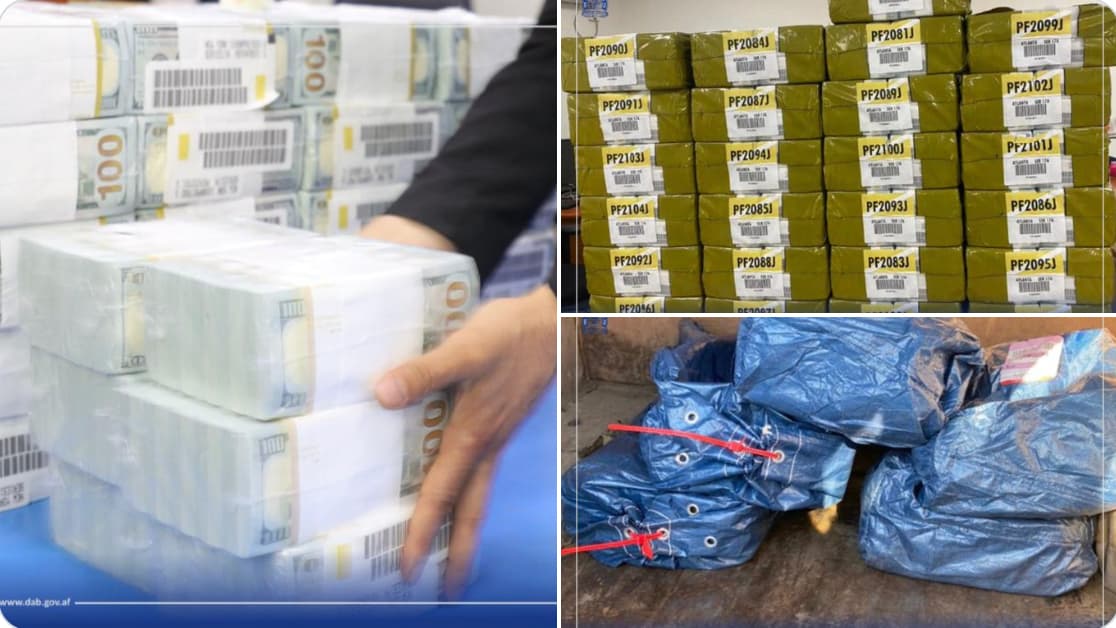Who Is Flying Multi-Million Dollar Stacks of $100 Bills Into Kabul?
Foreign aid to Afghanistan rarely, if ever, reaches the people who need it most. Instead, its main beneficiary, the Taliban, distributes the cash to allies and family members in favored districts.

Who is flying pallets of $100 bills to the Kabul airport?
Worries that the Biden administration is funding the Taliban regime have grown since photos of tens of millions of dollars in cash have been repeatedly posted on social media by the central bank of Afghanistan in the last few months.
Sources say the cash, meant to help the population of Afghanistan as a cold winter sets in, ends up almost exclusively in the hands of the Taliban. Afghanistan’s shaky banking system has collapsed, replaced by a cash-based and barter-reliant economy, which is dominated by the terror group.
Aid deliveries in cash, critics say, are a “lifeline” for the Taliban, the Pashtun group that forcibly took over the country after America hastily departed in the Summer of 2021, leaving behind Afghan allies, including some American citizens.
“The most vulnerable and hunted of our allies are going into another winter of hunger and freezing, and are getting no assistance other than from the volunteer networks,” a special forces veteran in Afghanistan, Scott Mann, told the Sun.
In his book, “Operation Pineapple Express,” Mr. Mann details the efforts of volunteering colleagues to assist former American allies neglected by official Washington.
The most recent photos posted on Twitter by the Taliban-controlled central bank, Da Afghanistan Bank, show an estimated $40 million neatly packed in plastic casings lying around at a Kabul airport tarmac. The bank appreciates “any principled action that leads to the arrival of currency to the country and to help the needy,” it tweeted in Pashto, without specifying the source of the cash.
The United Nations, for one, transfers cash to Afghanistan to support its humanitarian efforts, but “these funds are distributed directly to the UN agencies, funds, and programs, and humanitarian partners in Afghanistan,” Secretary General Guterres’s spokesman, Stephane Dujarric, told the Sun.
The cash in the bank’s recent tweet is not the first delivery of financial aid, a member of the volunteer network described in Mr. Mann’s book, a man known as Legend, told the Sun. Up to $1.8 billion has been delivered in a similar fashion to Afghanistan in recent months, the former member of the US forces said. Legend spoke on condition of anonymity as he often travels to the country. Similar twitter announcements from Da Afghanistan Bank would seem to confirm his account.
“No one in Afghanistan believes that the cash comes from anywhere but America,” Legend said. The funds, he added, have turned Afghans who despise the Taliban against America, as they end up in the hands of their most hated enemies.
Legend recalled sitting at a Kabul restaurant when a group of Taliban men arrogantly walked in, ordering waiters around. After demanding to consume milk shakes with spoons, rather than straws, the men pulled out large wads of crisp $100 bills to pay for their order. The spectacle, as a group of little boys were begging outside for food, was a good illustration of the disparity between rulers and the ruled.
“All the money ends in the hands of the Taliban,” Legend said. The deputy governor of the Da Afghanistan bank, Noor Ahmed Agha, he noted, was sanctioned by Washington in the past for terror-financing activities on behalf of the Taliban. Now, absurdly, his role at the bank is to assure no financial aid goes to terrorists.
In September, the Treasury Department released $3.5 billion of Afghan assets that had been held in a New York bank since the Taliban took over the country in August 2021. The unfrozen funds are deposited in a Swiss bank to be doled out in Afghanistan for the purpose of providing aid.
“The Taliban are not a part of the Afghan Fund, and robust safeguards have been put in place to prevent the funds from being used for illicit activity,” the treasury and state departments wrote in a joint statement. The fund was designed to “reduce suffering and improve economic stability for the people of Afghanistan while continuing to hold the Taliban accountable,” deputy secretary of state Wendy Sherman added.
Yet, the cash deliveries to the Kabul airport are separate from the Swiss fund, the National Resistance Front for Afghanistan head of foreign relations, Ali Maisam Nazary, told the Sun. “We’ve seen several such deliveries in the last few months,” he said. “It is given by the U.S. to be injected into the economy.”
Yet, Mr. Nazary added, foreign aid rarely, if ever, reaches the people who need it most. Instead, its main beneficiary, the Taliban, distributes the cash to allies and family members in favored districts.
In areas where ethnic groups other than Taliban-favored Pashtuns live, no aid is delivered. Aid from the UN and other international bodies is typically dispersed by non-governmental organizations, but those too are dominated by the Taliban. “Even inside Kabul we see discrimination in how aid is being dispersed,” Mr. Nazary said.
Groups opposing the Taliban are “not against humanitarian aid,” Mr. Nazary added. “We’re against the current system that benefits the Taliban. If today the cash is cut off, the Taliban is going to collapse. It provides a life line for them.”

